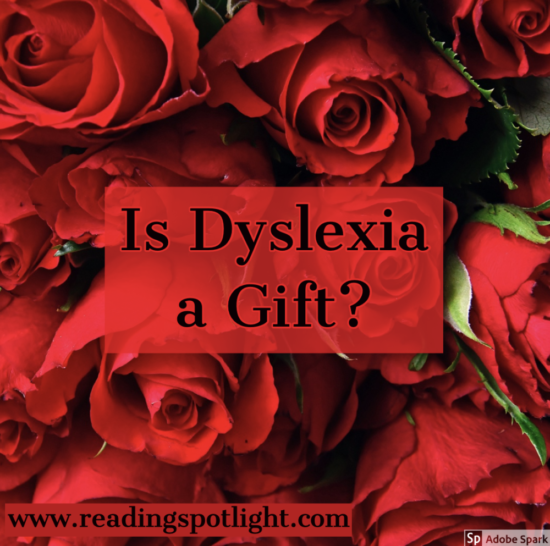Do you think that dyslexia is a gift?
Read this post before you decide.
As soon as I entered the optical store while on vacation in southern Florida, I knew the owner was different. Sand covered the entire floor, one inch deep, and the waiting room was lined with beach chairs surrounded by tall palm plants. Assorted seashells sat on racks of eyeglass frames, and wide-brimmed beach hats, fishing hats with attached lures, and baseball caps of different teams hung above the shelves. Several live orchids rested on glass cases that contained even more frames.
When my turn came, I had a simple request. I needed to have my glasses tightened because they constantly fell off while I was doing my favorite activity—reading a book. Unexpectedly, she told me she was dyslexic. When I mentioned that I was a reading specialist, she looked me straight in the eye for a moment, waited, and then began to recount the numerous hurtful experiences that she encountered growing up: teachers who thought she was stupid, peers who teased her, years of reading specialists who did not address her problems, and counselors who told her she would amount to nothing. No one believed in her, except her father.
It is not my purpose here to discuss the causes of dyslexia, nor the educational solutions. For more information about dyslexia, see my
Free Tip: What is Dyslexia?@readingspotlight.com
or other websites, including dyslexia.com where some of the information in this post originated. I am more concerned here with the emotional toll of the situation.
Dyslexics in elementary school who encounter difficulties with phonics, fluency, comprehension, and writing would not think that dyslexia is a gift. Preteen dyslexics who are faced with changing bodies, complicated social interactions, including texting, and new educational schedules that include more teachers, more subjects, and more difficult text, would not think that dyslexia is a gift, either. Teenage dyslexics encounter even more teachers who teach the content of their subject, but who, unless required by some authority, make few allowances for individual learning differences. These teens face less support, more and independent assignments, along with even more challenging texts. The adult pressure to ponder their future careers is common, but in an atmosphere where individual strengths and weaknesses are poorly evaluated or appreciated. To give credit where it’s due, this situation is starting to change a bit in American education.
Dyslexics do often have characteristics that can lead to success in various fields. They can have vivid imaginations, can be highly aware of their environment, and might be more curious than most. Many of them think multi-dimensionally, in pictures and in 3-D.
Fortunately, historical research has identified some famous dyslexics, and some current adult dyslexics are coming out of the shadows to describe their challenges, struggles, and successes. That’s some good news about modern media spreading the word!
This list includes just a few famous and successful dyslexics. Help dyslexic students find their stories for inspiration. Better yet, read some short excerpts of their lives to your entire class. Then decide if dyslexia is a gift.
- Leonardo da Vinci (artist, architect, mathematician, inventor)\
- Galileo Galilei (astronomer)
- Jules Verne (underwater adventure novelist, Around the World in 80 Days )
- Albert Einstein (world’s most famous physicist, known for Theory of Relativity)\
- Gavin Newsome (governor of California)
- Richard Branson (entrepreneur—Virgin Records, Virgin Airlines)
- Barbara Corcoran (Shark Tank shark, developer of NY’s largest real estate empire)
- Tommy Hilfiger (clothes designer)
- Steve Jobs (Apple founder)
- Ted Turner (founder of Turner Broadcasting, including CNN)
- Invar Kamprad (IKEA founder)
- Gary Cohn (CEO investment banker)
- Mohammed Ali (world’s most famous boxer)
- Meryl Davis (Olympic Gold Medalist in Ice Dancing)
- Steven Spielberg (movie director)
- Tom Cruise, Olivia Spencer, Whoopi Goldberg, Henry Winkler, Jim Carrey, Kiera Knightly (actors)
- Cher (actor and singer)
- Jay Leno, Goldie Hawn (comedians)
- John Lennon (Beatle lyricist)
- Erin Brockovich (legal analyst and environmentalist)
- Carol Greider (microbiologist, winner of Nobel Prize in Medicine)
- Dav Pikley (Captain Underpants author)
- Jamie Oliver (chef)
- Anderson Cooper (television journalist)
There are many, many more…
So, what do you think—is dyslexia a gift?
If you are also interested in short biographies, not of dyslexics, but of inspiring women, you might consider these
for the month of March. They combine vowel practice with short bios of 8 famous women,
or this Crossword Puzzle for Women’s History Month: Female Firsts
© Reading Spotlight 2019

You are invited to the Inlinkz link party!
This INlinkz link includes some other interesting posts about education from my friends at TBOTEMC.


